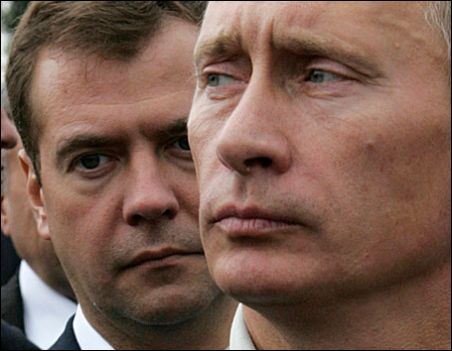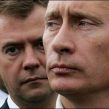
LEADING POLITICAL SCIENTIST ADMINISTERS LAST RITES TO REFORM HOPES
Publication: Eurasia Daily Monitor Volume: 5 Issue: 176
By:

Has the conflict between Russia and Georgia jeopardized hopes that Russia can pursue a path of economic modernization based on “innovation,” as both President Dmitry Medvedev and Prime Minister Vladimir Putin have promised? That view was put forward by political scientist Lilia Shevtsova, of the Carnegie Moscow Center, in an interview with Yevgeny Kiselyov on his program “Vlast” on September 12. Shevtsova argued more generally that Russia’s ruling tandem had become a hostage of its own anti-Western propaganda.
Kiselyov noted that in the wake of the five-day Russo-Georgian war, Medvedev and Putin had spent a lot of time meeting with Western politicians, journalists, and political scientists (he was apparently referring, among other things, to the fifth annual Valdai Club meeting). Yet while such meetings appeared to have been aimed, at least in part, at mending fences, Kiselyov pointed out that both leaders had also made a number of harsh statements and accusations aimed at the West, which would seem to undermine the goal of improving relations.
This contradictory behavior demonstrates how the system of power over which Putin and Medvedev preside forces them to “play two pianos at the same time,” said Shevtsova. “On the one hand, Putin, Medvedev, and the Kremlin elite are fully aware that further escalation of the confrontation with the West would be ruinous for that very power, for that very system, because it is a system of a class of rentiers who sell raw materials … to the West and survive that way; that is, they cannot afford a confrontation, much less a war, with the West,” she said. “And they obviously understand that they went too far and need to back off. That’s the performance on one piano. The second piano must play a different melody, namely, they are nonetheless consolidating Russia on the basis of anti-Western rhetoric; that is, they are … keeping the country under control by using the image of a besieged fortress. And everything depends on gamesmanship that consists of combining what would seem to be incompatible: to be an enemy of the West and simultaneously to show that we, in principle, do not rule out … negotiations and even a partnership with the West.”
According to Shevtsova, beginning at least in 2004 (when Putin moved to centralize political power in the wake of the Beslan hostage crisis), the Kremlin created a system that uses perceived outside threats as a way to mobilize society. “And now the architects who created a type of system that is consolidated on the basis of searching for enemies … have become slaves and hostages of that system, and this will be very difficult to halt,” she said. “In any case, they have now, it seems to me, taken an irretrievable step–I mean, in August 2008 [the attack on Georgia]. They have created a watershed between the old epoch, when there was hope for Russia’s integration with the West, and a new epoch, in which Western public opinion … regards Russia as an alien civilization.”
The problem with Russia’s current direction, Shevtsova argues, is not so much that it is authoritarian, but that it is anti-Western. The examples of China and Singapore show that authoritarianism is not necessarily incompatible with “innovational reform,” she said. “But there has not and will not be any example of a country that creates itself and reproduces itself on an anti-Western basis, carrying out a technological revolution and creating, for example, nanotechnologies,” Shevtsova said. “In order to create an economy of a high level–the kind of economy … that is being created by India and partly by China–you need Western know-how, Western long-term credits, Western standards, and, above all, Western political standards, meaning competitiveness, the supremacy of law, separation of powers and property, and, of course, the country’s integration into the global economy and Western institutions.… There isn’t a single country that could become genuinely highly organized and successful without associating with the West.”
Shevtsova ended her interview with comments that sounded like a funeral oration for any hopes that Dmitry Medvedev would preside over a move toward liberalization or even just a “thaw.”
“Theoretically Dmitry Medvedev had great constitutional potential to try to turn the trajectory or vector in another direction,” but this would have required taking a risk that “could have broken his neck,” Shevtsova said. In addition, Medvedev faced “systemic restraints” that narrowed his room for maneuver.
“Above all, he was chosen for the role of guarantor of continuity, for reproduction of the system,” Shevtsova said. “But while Putin could shape his own regime when Yeltsin left power, Medvedev, in the format of the tandem [with Putin], in the format of this Argentine tango, had much less room for maneuver. In the end, a situation emerged in which Medvedev had far fewer possibilities to carry out reforms than Putin had in 1999. Why? Because the Chechen war of Vladimir Putin did not prevent him from being a pro-Western leader and did not prevent him from starting highly successful economic reforms … And now the anti-Western mobilization of Russian society that Dmitry Medvedev symbolizes, in point of fact, has closed the possibility of his transformation into a reformer” (“Vlast,” RTVi television and Ekho Moskvy radio, September 12).




